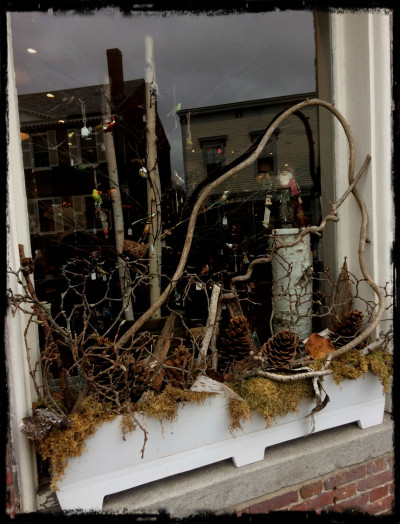A Soulful Place

Marblehead Window
As I write this, it is mid-morning, mid-December, and the pale sun is doing nothing to temper 11 degrees of smarting, searing cold. Even last night’s full moon that turned the bare trees to windblown shadows rose somber and aloof. These are, indeed, the shortest days of the year when the four o’clocks hit hard.
I light the little green candle on the stove, nudge up the thermostat, add another layer of sweater and fingerless gloves, pour a cup of ginger tea, and look at this photo I took last week of a shop window in Marblehead, Massachusetts, a captivating place that long ago ran off with my heart.
Up there on the edge of Boston’s North Shore, Marblehead is an old seafaring town. Its crooked houses painted in witchy colors have uneven sidewalks for front yards with tiny scrappy gardens in back. Narrow streets loop up and around and end, of course, in the water that encircles and defines this place. In Marblehead, gray cats wander in the colonial cemetery up on the hill overlooking the even grayer sea. It is a town I love most in winter.
I considered moving here back when Book II of my life began, but the thoughts that surfaced were by turn appealing and then unsettling. Remoteness was the true Siren’s call; the fact that once you’re here, you’re pretty much here. I could see myself wearing long black skirts and eccentric hats and wandering the dusky streets alone except for a cat or two. I might be conjugating French verbs or reciting an incantation or the last lines of an impenetrable poem. Somehow I knew that I might clank shut if I lived here, becoming a person too inward, too cloistered, locked away in Wonderland.
Still, when I visit in December, the town is persuasive and alluring, almost talking me into staying. Since we see what we are looking for, I’m blind to the money, the yacht clubs, the understated, expensive cars. I see only the rich patina of age and time and all the lives lived in the crook-jawed houses that have weathered and sheltered and heard the stories, absorbed generations of joys and sorrows. There is eloquence in all this telling, simple and substantial.
In the window box, it’s the artfully designed tangle of things found mostly underfoot, the harmony of vine, pine cones, sticks, moss, driftwood, and a few lights that sings to me. Marblehead is a soulful place. When I trudge up to the cemetery with its tilting, mossy stones carved with heads of angels, when I look out over the water, have a good talk with a wizened, bemused cat, I know I am close to home.